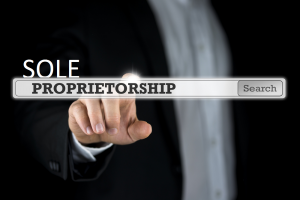What is a Sole Proprietorship?

A sole proprietorship is a business that legally has no separate existence from its owner. Income and losses are on the individual’s personal income tax return. The sole proprietorship is the simplest business form under which one can operate a business. Also, the sole proprietorship is not a legal entity. It simply refers to a person who owns the business and is personally responsible for its debts. A sole proprietorship can operate under the name of its owner or it can do business under a fictitious name, such as Safeline Insurance. The fictitious name is simply a trading name–it does not create a legal entity separate from the sole proprietor owner.
The sole proprietorship is a popular business form due to its simplicity, ease of setup, and nominal cost. A sole proprietor needs to only register his or her name and secure local licenses, and the sole proprietor is ready for business. A distinct disadvantage, however, is that the owner of this type of business remains personally liable for all the business’s debts. So, if a sole proprietor business runs into financial trouble, creditors can bring lawsuits against the business owner. If such suits are successful, the owner will have to pay the business debts with his or her own money.
The advantages of an SP include:
- Easy and inexpensive to form: A sole proprietorship is the simplest and least expensive business structure to establish. They carry little, if any, ongoing formalities.
- Complete control. Because you are the sole owner of the business, you have complete control over all decisions. Owners may freely mix business or personal assets.
- Simplified tax preparation. Your business is not taxed separately, so it’s easy to fulfill the tax reporting requirements. A sole proprietor need not pay the unemployment tax on himself or herself.




